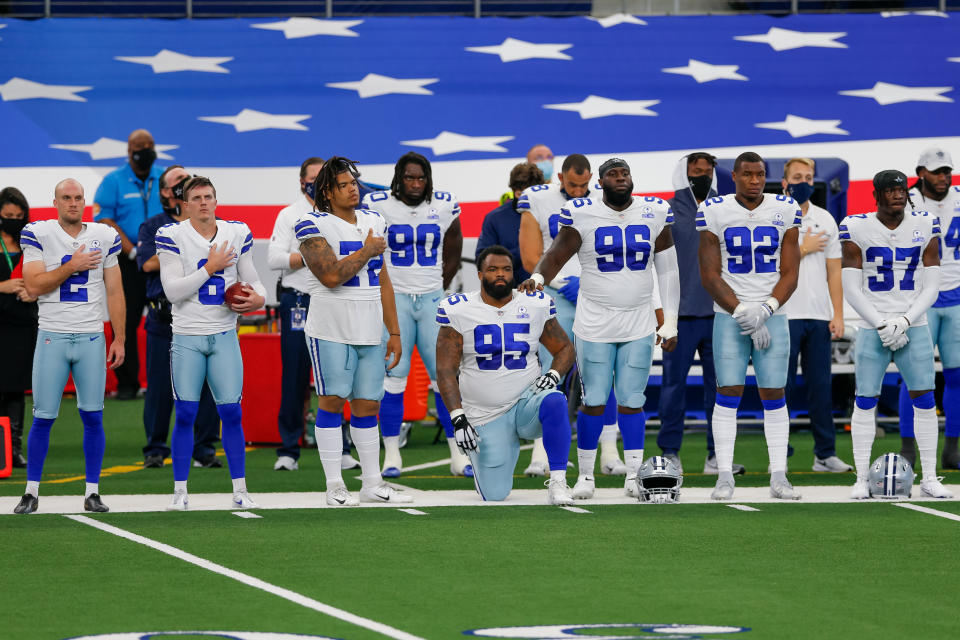Activism? Election? Pandemic challenges? New Marist poll suggests none of them are causing sports' TV ratings decline
No, the increased political activism in professional sports doesn’t explain the ratings decline.
And no, the sports where that activism is most pronounced, like the NBA, haven’t suffered more in comparison.
The presidential election isn’t distracting people from sports.
The changes to the rules and viewer experience during the pandemic have not, in fact, caused people to tune out, either.
Conversely, the free time created by COVID-19, as people work and stay home more, has not made any substantial difference in sports viewership.
Those were the findings of a new survey by the Marist Poll. (Disclosure: the author is a lecturer at Marist College.) A poll of 1,560 American adults, conducted in late September, suggested that a lot of the narratives surrounding the steep ratings decline in sports television are unfounded.
Since sports slowly resumed, in bubbles or empty stadiums, TV ratings have precipitously declined. The NBA Finals were down by more than half from last year. The Stanley Cup Final was down some 61 percent. The MLB playoffs haven’t fared much better, off by about 40 percent. Even the mighty NFL has seen a drop-off of 14 percent.
This has led to fevered speculation about the reasons behind the ratings collapse. Some have been in good faith; some in bad.
But the new poll doesn’t support any of the above theories.

Almost half of respondents — 46 percent — said the political outspokenness of athletes, who have rediscovered their voice after years of shying away from partisanship and social issues, made no difference in their live TV sports consumption. Almost a third said it did, but 21 percent also said the politics made them more likely to watch. That’s an 11 percent delta, which doesn't really correlate to the drop in ratings, and is hard to pin down as a mitigating factor either way.
The notable exception was NASCAR. While pluralities of football, basketball and baseball fans said the athletes’ political views didn’t impact their viewing habits, 44 percent of fans of NASCAR — where a reckoning with Confederate flags and a purported noose hung in the paddock of a Black driver set off a reckoning — said that it did.
The people who said that they watched less sports were more likely to be men (36 percent) than women (28 percent); more likely to be over 45 years old (36 percent) than under (26 percent); and far more likely to be Republicans. Among the latter group, 70 percent said they were more likely to watch less sports while 61 percent of Democrats took the opposite stand and said political outspokenness among athletes hadn’t changed their viewing habits.
In an adjacent vein, Black sports fans were almost twice as likely as white ones to say they were watching more sports on account of the politics.
If this attempted explanation at the plummeting TV ratings doesn’t quite wash, neither does the notion that the presidential election has distracted from sports, which the skyrocketing cable news ratings seem to imply. In the poll, 64 percent of respondents said the election hadn’t influenced their sports viewing.
The rule changes, most noticeably in baseball, and lack of live fans weren’t a major factor either. More than seven in 10 fans said those were inconsequential. And whatever free time was created by the pandemic had no effect on the amount of sports viewed by a plurality of the fans queried.
It may just be that the timing of all of those sports coinciding into so-called “sports equinoxes”, because the 3-month interruption to sports created a logjam that cannibalized viewers through fearsome competition for their eyeballs. But there isn’t compelling evidence to support that idea either.
There is a more alarming possibility, or alarming for the sports industry, anyway. Perhaps it’s as simple as fewer people being into sports than there used to be. In the polling, the number of Americans who said they watched sports had dropped slightly from 60 to 57 percent, but the decline in fans for specific sports was far more noticeable. A 16 percent drop for baseball and basketball in just a few years. A slide of about a quarter for football and NASCAR.
Maybe people are just less interested than they used to be. Nearly half of fans reported watching fewer sports broadcasts than they used to, especially in the older age category.
Or maybe it’s a combination of all of the above. But there isn’t any one factor at play, per the numbers, no matter how expedient such an explanation might be.
Leander Schaerlaeckens is a Yahoo Sports soccer columnist and a sports communication lecturer at Marist College. Follow him on Twitter @LeanderAlphabet.
More from Yahoo Sports:

 Yahoo Lifestyle
Yahoo Lifestyle 

